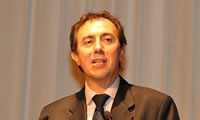Political Change in the Middle East:
Civil-military Relations, Democratization, and International Commitment
January 31, 2012, (Tuesday)
B2F, Room "Daigo", Sheraton Miyako Hotel Tokyo
>>Event Guide/Program
Organizers: IDE-JETRO, The World Bank, The Asahi Shimbun Company
Keynote Address1 | Keynote Address2 | Panel Discussion(1) | Panel Discussion(2)
Keynote Address2: Economic Opportunities and Issues after the “Arab Spring”
Cyril Muller (Vice President for External Affairs, The World Bank)
I am greatly honored that the World Bank has been given the opportunity to host this international symposium with IDE-JETRO and The Asahi Shimbun Company. Professor Lisa Anderson’s keynote address gave me a new appreciation of the Middle East as a region teeming with diversity. In my address, I would like to discuss the nature of issues facing the Arab region from an economic and development perspective. Another topic will be how developments that are under way at this very moment will impact the region’s economy and development.
Professor Anderson noted that appreciating the complexity and diversity of this region is key to understanding its political landscape. I believe that the same can be said of the economic landscape as well. I have four topics I would like to discuss today. First is the economic outlook for the region. Second is investment opportunities and related issues. Third is the reform agenda in the region. Finally the role of the World Bank Group.
Let me begin with the first topic, the economic outlook. The GDP growth rate in the Middle East and North Africa (MENA) region dropped to 1.7% in 2011. However, the World Bank Group projects that the GDP growth rate for the MENA region will recover to 2.3% in 2012 and 3.2% in 2013. This forecast is largely based on expectations of new inward investment. On the other hand, the downside risks for the region include: (1) instability in domestic politics; (2) the impact of economic weakness in the euro zone (EU); (3) fiscal deterioration. This is because it is generally believed that the ongoing European financial crisis will have a serious impact particularly on the MENA region—even when compared with the financial crisis of 2008. Furthermore, there are concerns about the serious impact of the European financial crisis on oil-importing developing countries that do not produce oil.
Let me now turn to my second topic, investment opportunities and issues. We cannot ignore the impact of the deterioration in macroeconomic conditions on the investment environment. Inward investment has slowed in almost all countries in the North Africa region. (The exception is Morocco, where the volume of aid inflows from Persian Gulf states has continued steadily, partly due to Morocco's tourism sector. This has also helped to guarantee liquidity.) In the short term, corporations have reduced, suspended or canceled investment in the MENA region. We expect this situation to continue for some time. However, let me add that this region actually has solid investment opportunities. The World Bank Group has published a report containing a very interesting proposal concerning the MENA region. In the report, the World Bank Group notes that despite short-term weaknesses, no major changes to the region’s investment climate are evident over the long term. With a population of 355 million, the MENA region has an immense segment of middle income earners. Furthermore, we see improvement in several important indicators of social development. For example, the average lifespan has reached around 70 years of age and the completion rate for elementary level education is high at 90%. The infant mortality rate has also shown improvement. These factors should prove attractive in the eyes of investors. In fact, according to the results of a survey conducted by the Multilateral Investment Guarantee Agency (MIGA) of the World Bank Group, investors have indicated that they are ready to invest in the MENA region. That said, these investors require at least one year of political stability in a given country. Interestingly, these investors also note that they are ready to consider investments even in countries with non-democratic governments, provided that there is at least one continuous year of political stability. (Excluding hotspots such as Iran and Iraq)
My third topic is the future reform agenda. In order to set up free, transparent and responsible governments, we believe that it is crucial to reform the economic systems and economic policies that underpin such governments. The creation of employment is another pressing theme for the region. Many people who gathered at Tahrir Square were young people. We hope to see the creation of a quality and quantity of employment commensurate with the needs of young people in this region, where the accumulation of human capital is proceeding apace. Finally, my fourth topic concerns assistance by the World Bank Group. Ever since the Arab Spring, the World Bank has emphasized transparency. The World Bank requires all borrowers to disclose their financial position as a condition for extending loans. The World Bank is providing assistance designed to improve accountability and government transparency by promoting the implementation of economic reform programs based on structural reforms, including the amendment of various laws. The World Bank Group has long emphasized providing assistance designed to improve various economic factors. At present, the World Bank is focused particularly on providing support that leads to government transparency, the establishment of sustainable governments, and the creation of employment.

Cyril Muller
(Vice President for External Affairs,
The World Bank)
Keynote Address1 | Keynote Address2 | Panel Discussion(1) | Panel Discussion(2)

